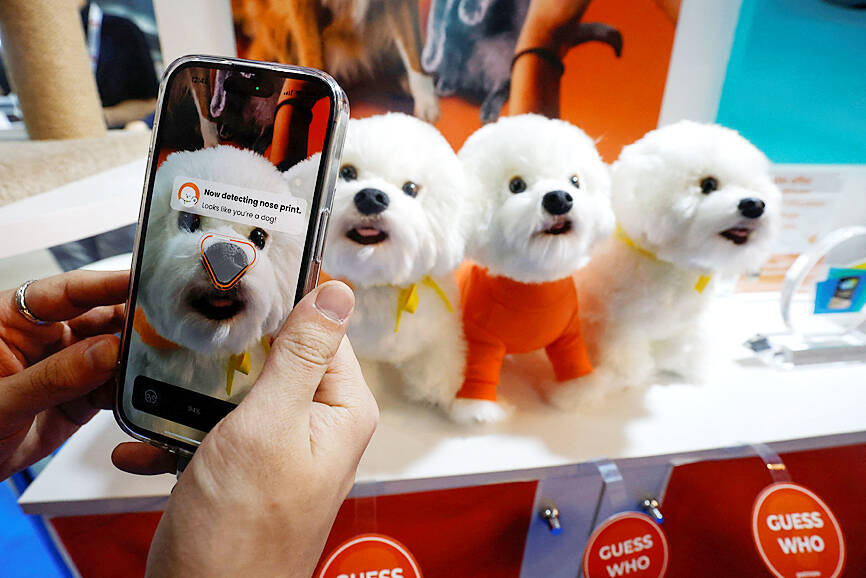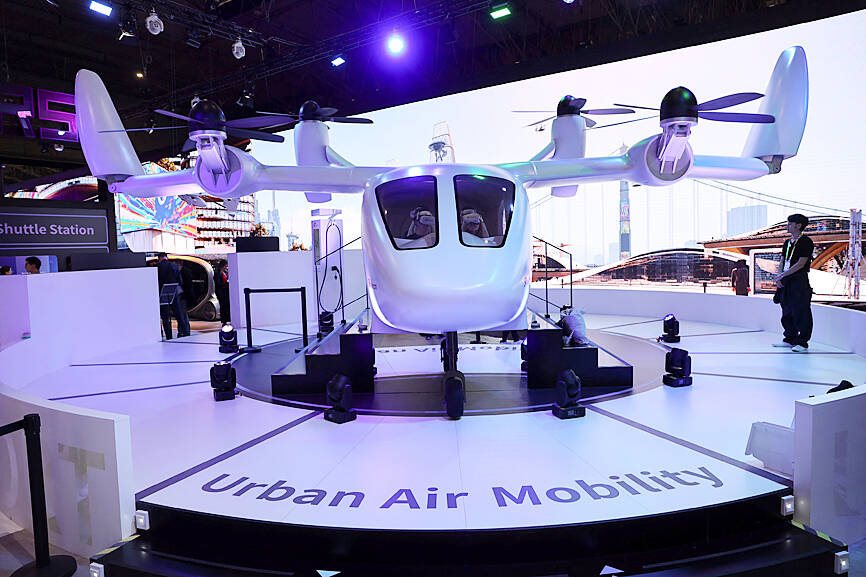The Mobile World Congress (MWC) is primarily a gathering for the bigwigs of the telecoms industry, but far from the main thoroughfares of the vast conference there are always hidden tech gems.
Among the most offbeat products spotted at last week’s event was artificial intelligence (AI) clone technology.
As advertising slogans go, “you can live forever” is up there with the best.

Photo: Reuters
That is how Memori Yamato described the “personalized AI clone” from her Japanese company Alt Inc.
“Your descendants can continue to speak and interact with you, even after your death,” Yamato said.
The idea is to upload as many videos, images and audio samples as you can while alive.

Photo: Reuters
The system would use that data to generate an AI mirror, cloning you in the digital world.
“It will look like you, it speaks in your voice and it even thinks like you,” she said.
The idea has been nine years in the making, and feedback from early users suggests the technology has nailed appearances and voices, she said.
NOSEPRINT
A dog’s nose carries similar identifying traits as a human fingerprint. South Korean start-up Petnow Inc took this information and ran with it — like a dog after a stick — to create a biometric database of pets based on noseprints rather than microchips.
“Since the 1940s, we’ve known that dogs’ noses worked a little like fingerprints,” Petnow business development manager Peter Jung said.
About 100,000 animals are abandoned each year in South Korea, often because owners cannot afford vet bills, he said.
“Less than 10 percent have chips because people don’t like the process,” he said.
Petnow just requires a photo and AI does the rest, ensuring the photos are good enough for identity purposes.
Jung said that 50,000 pet owners have signed up since last year, and he hopes the government will change the rules to allow his system to replace chips.
Cat lovers need not worry.
Their noses might be too petite to be identifiable, but each feline face is unique and can be used in the system, the company said.
TAKING FLIGHT
A staple from the pages of science fiction and the dreams of the superrich, flying taxis could be available as soon as 2025, SK Telecom Co said.
At the MWC, some attendees got an early taste, thanks to virtual reality headsets and a prototype complete with juddering seats.
Halfway between a helicopter and a drone, the craft has six electric motors that allow vertical takeoffs and landings.
It can carry up to four passengers and move at speeds of up to 320kph.
South Korea’s biggest telecoms provider developed it with Californian start-up Joby Aviation and hopes it will solve congestion in South Korea’s cities without adding to global warming.
“In Korea, in urban areas, we have severe traffic congestion, but constructing a mass transportation system like a highway or subway needs many social costs,” SK Telecom manager Ken Wohn said.
“Using this UAM [Urban Air Mobility] service can shorten our customers’ travel time without making so much infrastructure,” he said.
NEVER ALONE
People might live their later years in the company of “socially intelligent” robots capable of “building an emotional relationship” with them.
That is the vision of Spanish technology outfit Eurecat, which has developed a robot called NHOA — or “never home alone.”
It is designed to reduce the loneliness of older people living at home.
The orange and white robot stands 160cm tall and can be controlled with a touchscreen and by voice.
Eurecat healthcare innovation manager David Mari said the aim was not to replace human relationships, but to “humanize” the applications and connected objects used by older people.

‘SWASTICAR’: Tesla CEO Elon Musk’s close association with Donald Trump has prompted opponents to brand him a ‘Nazi’ and resulted in a dramatic drop in sales Demonstrators descended on Tesla Inc dealerships across the US, and in Europe and Canada on Saturday to protest company chief Elon Musk, who has amassed extraordinary power as a top adviser to US President Donald Trump. Waving signs with messages such as “Musk is stealing our money” and “Reclaim our country,” the protests largely took place peacefully following fiery episodes of vandalism on Tesla vehicles, dealerships and other facilities in recent weeks that US officials have denounced as terrorism. Hundreds rallied on Saturday outside the Tesla dealership in Manhattan. Some blasted Musk, the world’s richest man, while others demanded the shuttering of his

ADVERSARIES: The new list includes 11 entities in China and one in Taiwan, which is a local branch of Chinese cloud computing firm Inspur Group The US added dozens of entities to a trade blacklist on Tuesday, the US Department of Commerce said, in part to disrupt Beijing’s artificial intelligence (AI) and advanced computing capabilities. The action affects 80 entities from countries including China, the United Arab Emirates and Iran, with the commerce department citing their “activities contrary to US national security and foreign policy.” Those added to the “entity list” are restricted from obtaining US items and technologies without government authorization. “We will not allow adversaries to exploit American technology to bolster their own militaries and threaten American lives,” US Secretary of Commerce Howard Lutnick said. The entities

Taiwan’s official purchasing managers’ index (PMI) last month rose 0.2 percentage points to 54.2, in a second consecutive month of expansion, thanks to front-loading demand intended to avoid potential US tariff hikes, the Chung-Hua Institution for Economic Research (CIER, 中華經濟研究院) said yesterday. While short-term demand appeared robust, uncertainties rose due to US President Donald Trump’s unpredictable trade policy, CIER president Lien Hsien-ming (連賢明) told a news conference in Taipei. Taiwan’s economy this year would be characterized by high-level fluctuations and the volatility would be wilder than most expect, Lien said Demand for electronics, particularly semiconductors, continues to benefit from US technology giants’ effort

Minister of Finance Chuang Tsui-yun (莊翠雲) yesterday told lawmakers that she “would not speculate,” but a “response plan” has been prepared in case Taiwan is targeted by US President Donald Trump’s reciprocal tariffs, which are to be announced on Wednesday next week. The Trump administration, including US Secretary of the Treasury Scott Bessent, has said that much of the proposed reciprocal tariffs would focus on the 15 countries that have the highest trade surpluses with the US. Bessent has referred to those countries as the “dirty 15,” but has not named them. Last year, Taiwan’s US$73.9 billion trade surplus with the US